MEDIA: INTERNET: The Jewish Hand Behind the Internet – Facebook
“He met Mark Zuckerberg in 2002 after they had joined the same fraternity which primarily concentrated on activities within the Jewish community.
‘We ate Shabbat dinner together,’ Hasit said.
‘Every year we raised money for charities in Israel.
Mark was one of the members of the fraternity, like many other Jewish students at Harvard.’
Hasit, who wears a skullcap, says the 25-year-old Zuckerberg feels an affinity with Judaism.
‘He fasts on Yom Kippur,’ Hasit says of Zuckerberg.
‘Sometimes he would come to the Hillel House, a Jewish organization that ran various activities.’ “
– The Jew Arie Hasit, who now has joined the Israeli Defense Forces, on his personal experience of the Jewish Facebook founder and CEO, Mark Zuckerberg, Ha’aretz, 10/05/2009.

Ex-roommate of Facebook founder becomes rabbi in Israel | The Times of Israel
Rabbi Arie Hasit – The Schechter Institutes
Arie Hasit ’05 | Harvard University | History Department
Arie Hasit: “Everybody has opened a situation room” — UNSETTLED Podcast
Jewish founder and CEO
The popular social networking site Facebook, launched in February 2004, has a 100% Jewish founder and CEO, Mark Zuckerberg.
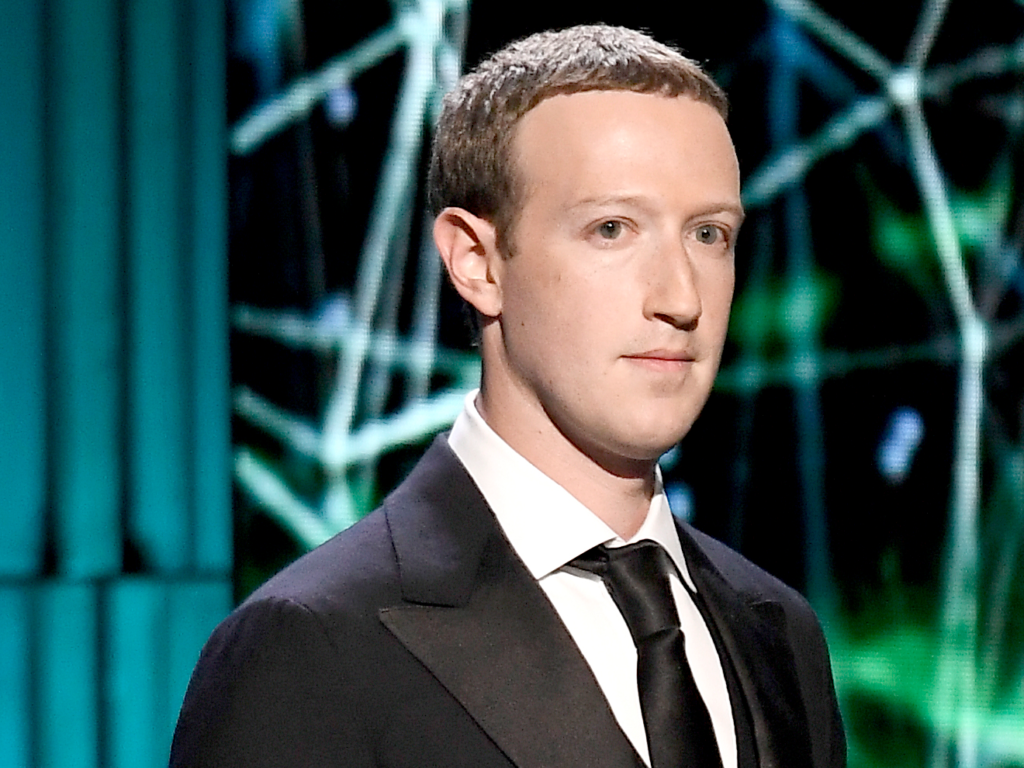
Mark Elliot Zuckerberg (/ˈzʌkərbɜːrɡ/; born May 14, 1984) is an American businessman and philanthropist. He co-founded the social media service Facebook, along with his Harvard roommates in 2004, and its parent company Meta Platforms (formerly Facebook, Inc.), of which he is executive chairman, chief executive officer and controlling shareholder. Zuckerberg briefly attended Harvard University, where he launched Facebook in February 2004 with his roommates Eduardo Saverin, Andrew McCollum, Dustin Moskovitz and Chris Hughes. Originally launched in only select college campuses, the site expanded rapidly and eventually beyond colleges, reaching one billion users in 2012. Zuckerberg took the company public in May 2012 with majority shares. In 2007, at age 23, he was the world’s youngest self-made billionaire at the time. He has since used his funds to organize multiple philanthropic endeavors, including the establishment of the Chan Zuckerberg Initiative. Time named Zuckerberg one of the most influential people in the world in 2008, 2011, 2016 and 2019, and nominated him as a finalist several other times. He was named the Time Person of the Year in 2010, the same year when Facebook eclipsed more than half a billion users. In December 2016, Zuckerberg was ranked tenth on the Forbes list of the World’s Most Powerful People. In the Forbes 400 list of wealthiest Americans in 2023, he was ranked eighth with a personal wealth of $106 billion. As of January 2024, Zuckerberg’s net worth was estimated at $130 billion by Forbes, making him the fifth richest person in the world. A film depicting Zuckerberg’s early career, legal troubles and initial success with Facebook, The Social Network, was released in 2010 and won multiple Academy Awards. Zuckerberg’s prominence and fast rise in the technology industry has prompted political and legal attention. The founding of Facebook involved Zuckerberg in multiple lawsuits regarding the creation and ownership of the website as well as issues of user privacy. In 2013, he co-founded the pro-immigration lobbying group FWD.us. On April 10 and 11, 2018, Zuckerberg testified before the United States Senate Committee on Commerce, Science, and Transportation regarding the usage of personal data by Facebook in relation to the Facebook–Cambridge Analytica data scandal.
Jews readily boast about this fact.
The Jewish ethnocentric site Jew or Not Jew: Choosing the Chosen People, see logo below, have a special entry for Zuckerberg (as they have for Google’s Sergey Brin and Larry Page), where Zuckerberg gets their “Jew Score” total of 12 (4 + 4 + 4).

Jew or Not Jew: Mark Zuckerberg
The site, which should be regarded as some case of internal Jewish humor, explains the meaning of this score:
About the Jew Score
We evaluate how Jewish a person is based on three factors.
How Jewish they are internally; how Jewish they are externally and how much we want that person to be a Jew in the first place.
In practice, the I Score tends to refer to birth history with some adjustments for how we imagine they see/saw themselves.
The O Score is for how Jewish they look and act.
The K Score stands for Kvell (pride) and is subject to the whims of the creators of this website.
The Jew Score refers to our opinion only and is affected by but not definitive of one’s actual Jewishness.
The site of the World Jewish Digest, as another example, also counts Mark Zuckerberg as one of their examples of Jewish influentials in their list “10 to watch in 2008 – WJS’s shortlist to Jewish standouts” .
Zuckerberg,
“Born into a well-to-do Jewish-American family in Dobbs Ferry, N.Y”
gets the ranking place of 3 in their list of 10 influential Jews.

Zuckerberg’s Jewish entourage at Facebook
The New York Times, May 13, 2009, reported:
The Israeli newspaper Haaretz noted that
“Facebook was founded by Mark Zuckerberg, a Jewish former Harvard University student.”
Mr. Schnitt [a Facebook spokesman] told ABC that while some employees of the social-networking service came from families marked by the Holocaust, that was not influencing their decision:
Many of us at Facebook have direct personal connection to the Holocaust, through parents who were forced to flee Europe or relatives who could not escape.
We believe in Facebook’s mission that giving people tools to make the world more open is a better way to combat ignorance or deception than censorship, though we recognize that others, including those at the company, disagree.
Facebook bans some Holocaust-denial groups, but not all – The Jewish Chronicle (thejc.com)
Facebook puts terms of service up for a vote (ft.com)
So, here we learn from the Facebook spokesman Mr. Schnitt that:
“Many of us at Facebook have direct personal connection to the Holocaust”
which of course means nothing else than that they are Jewish.
So, who are these Jewish actors?
To begin with, in the absolute beginning, when Zuckerberg decided to spread his new Facebook project to other schools than Harvard, he enlisted help from his Jewish friend Dustin Moskovitz.
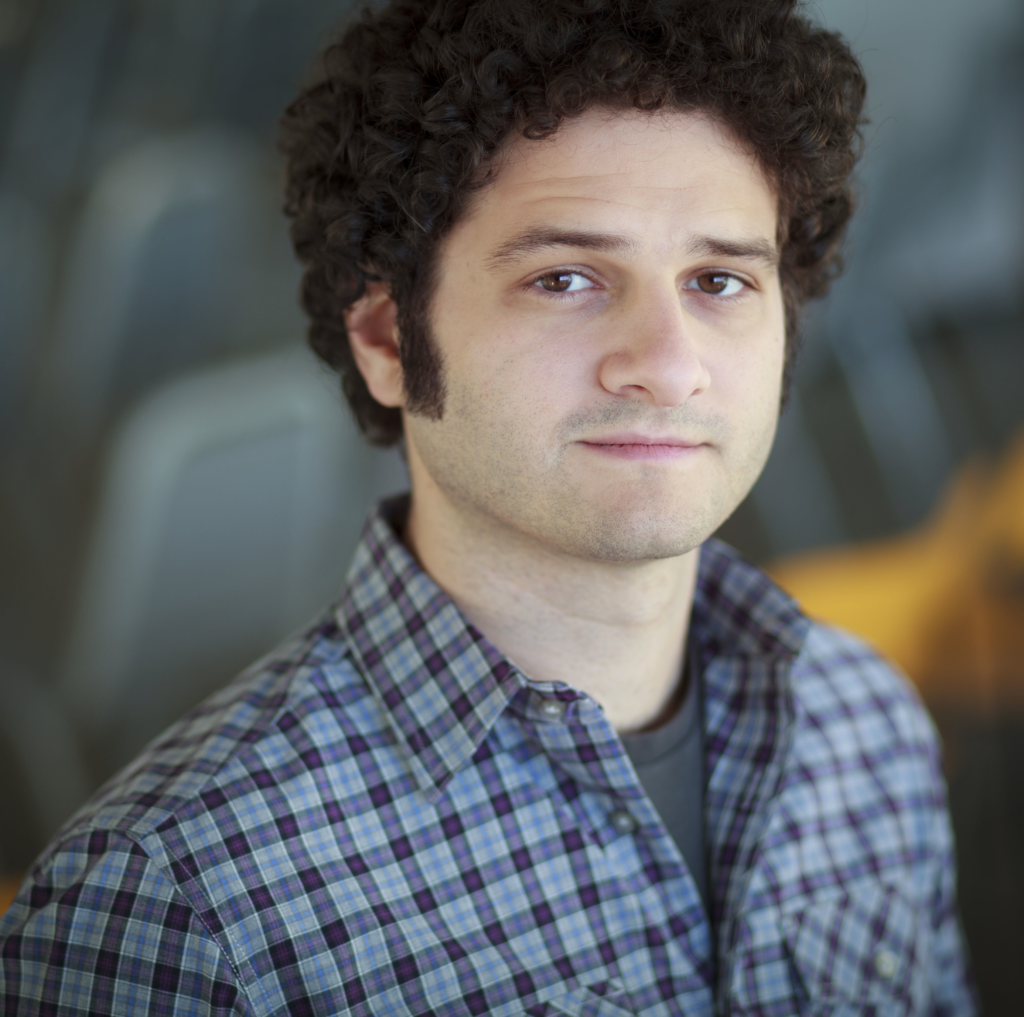
Dustin Aaron Moskovitz (/ˈmɒskəvɪts/; born May 22, 1984) is an American billionaire internet entrepreneur who co-founded Facebook, Inc. (now known as Meta Platforms) with Mark Zuckerberg, Eduardo Saverin, Andrew McCollum and Chris Hughes. In 2008, he left Facebook to co-found Asana with Justin Rosenstein. In March 2011, Forbes reported Moskovitz to be the youngest self-made billionaire in the world, on the basis of his then 2.34% share in Facebook. As of October 2023, his net worth is estimated at US$18.0 billion by the Bloomberg Billionaires Index.
Dustin Aaron Moskovitz (/ˈmɒskəvɪts/; born May 22, 1984) is an American billionaire internet entrepreneur who co-founded Facebook, Inc. (now known as Meta Platforms) with Mark Zuckerberg, Eduardo Saverin, Andrew McCollum and Chris Hughes. In 2008, he left Facebook to co-found Asana with Justin Rosenstein. In March 2011, Forbes reported Moskovitz to be the youngest self-made billionaire in the world, on the basis of his then 2.34% share in Facebook. As of October 2023, his net worth is estimated at US$18.0 billion by the Bloomberg Billionaires Index.
Moskovitz then became the Vice President of Engineering of Facebook.

They got their first funding from another Jew, German-born technology entrepreneur Peter Thiel, one of the founders of PayPal.
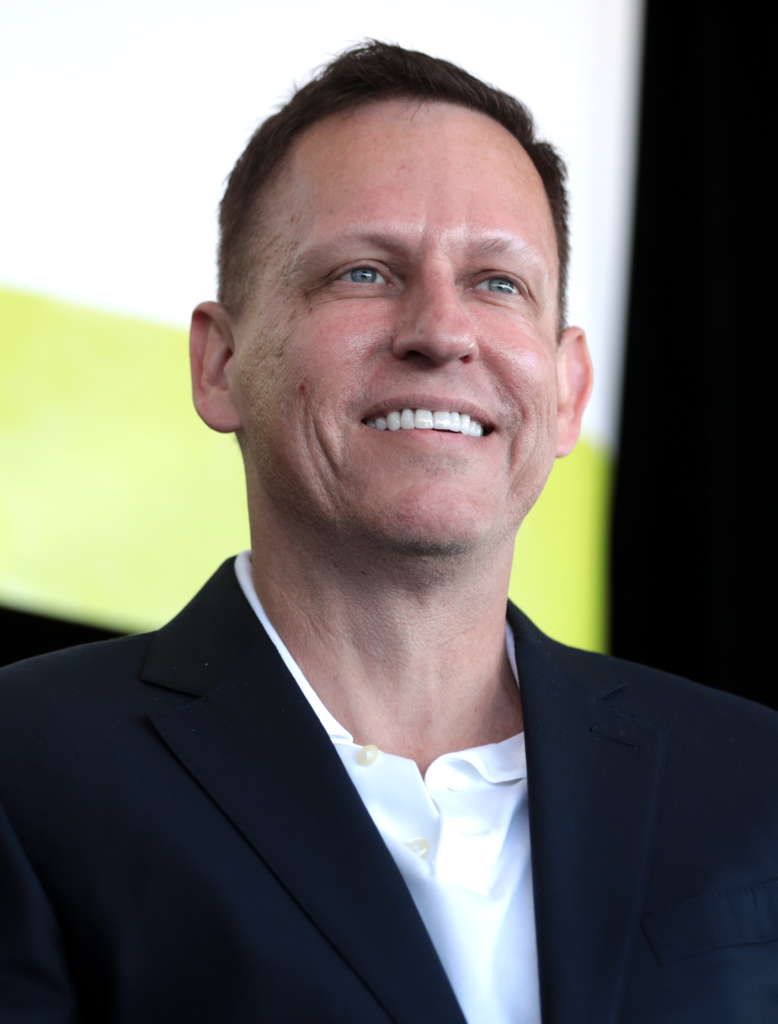
Peter Andreas Thiel (/tiːl/; born 11 October 1967) is a German American billionaire entrepreneur, venture capitalist, and political activist. A co-founder of PayPal, Palantir Technologies, and Founders Fund, he was the first outside investor in Facebook. As of June 2023, Thiel had an estimated net worth of $9.7 billion and was ranked 213th on the Bloomberg Billionaires Index. He worked as a securities lawyer at Sullivan & Cromwell, as a speechwriter for former U.S. Secretary of Education William Bennett and as a derivatives trader at Credit Suisse. He founded Thiel Capital Management in 1996. He co-founded PayPal with Max Levchin and Luke Nosek in 1998, serving as chief executive officer until its sale to eBay in 2002 for $1.5 billion. After PayPal, he founded Clarium Capital, a global macro hedge fund based in San Francisco. In 2003, he launched Palantir Technologies, a big data analysis company, serving as its chairman since its inception. In 2005, he launched Founders Fund with PayPal partners Ken Howery and Luke Nosek. Earlier, Thiel became Facebook’s first outside investor when he acquired a 10.2% stake for $500,000 in August 2004. He sold the majority of his shares in Facebook for over $1 billion in 2012 but remains on the board of directors. After the Fifth National Government intervened on his behalf, Thiel was controversially granted New Zealand citizenship in 2011 after spending 12 days in the country non-consecutively. He co-founded Valar Ventures in 2010; co-founded Mithril Capital, serving as investment committee chair, in 2012; and served as a part-time partner at Y Combinator from 2015 to 2017. Through the Thiel Foundation, Thiel governs the grant-making bodies Breakout Labs and Thiel Fellowship, and funds non-profit research into artificial intelligence, life extension, and sea steading. In 2016, Thiel confirmed that he had funded Hulk Hogan in the Bollea v. Gawker lawsuit because Gawker had previously outed Thiel as gay. The lawsuit eventually bankrupted Gawker and led to founder Nick Denton declaring bankruptcy. Thiel is a conservative libertarian who has made substantial donations to American right-wing figures and causes.
We here recommend reading an article from the Guardian (14 Jan 2008) on the people behind Facebook which has more information on Thiel.
The Guardian concludes that:
“… the real face behind Facebook is the 40-year-old Silicon Valley venture capitalist and futurist philosopher Peter Thiel.”

As a typical Jewish etnocentrist Thiel prefers to deal with other Jews.
His business partner with whom he who founded PayPal is the Ukrainian-born now-American Jew Max Rafael Levchin.
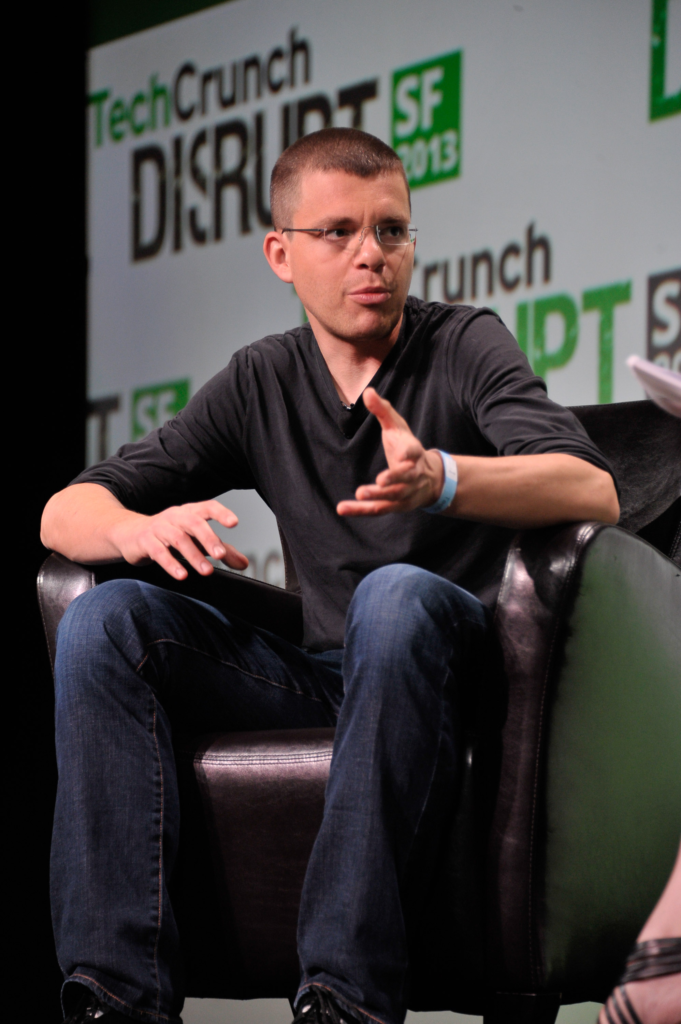
Maksymilian Rafailovych “Max” Levchin (Ukrainian: Максиміліан Рафаїлович Левчин; born July 11, 1975) is a Ukrainian-American software engineer and businessman. In 1998, he co-founded the company that eventually became PayPal. Levchin made contributions to PayPal’s anti-fraud efforts and was the co-creator of the Gausebeck-Levchin test, one of the first commercial implementations of a CAPTCHA challenge response human test. He founded or co-founded the companies Slide.com, HVF, and Affirm. He was an early investor in Yelp and was their largest shareholder in 2012. He left a leadership role in Yelp in 2015. Levchin was a producer for the movie Thank You for Smoking.
Other Jews Thiel is interacting with are David Sacks, PayPal’s former chief operating officer,

David Oliver Sacks (born May 25, 1972) is an entrepreneur, author and investor in internet technology firms. He serves as the general partner of Craft Ventures, a venture capital fund he co-founded in late 2017. Additionally, he is also a cohost of the All In podcast. Previously, Sacks was the COO and product leader of PayPal and founder and CEO of Yammer. In 2016, he became interim CEO of Zenefits for 10 months. In 2017, Sacks co-founded Craft Ventures, an early-stage venture fund. His angel investments include Facebook, Uber, SpaceX, Palantir Technologies, and Airbnb
and George Zachary, “a friend of Max and Peter’s” and partner of the Jew Ed Skoll from eBay.

George Zachary (forbes.com)
George Zachary: cancer scare led to health tech biotech investments (cnbc.com)
George Zachary | General Partner (crv.com)
How A Boston Venture Capital Firm Grew Into A Silicon Valley Powerhouse (buzzfeednews.com)
Below follows an excerpt from “Once You’re Lucky, Twice You’re Good: The Rebirth of Silicon Valley and the Rise of Web 2.0”, by Sarah Lacy on Thiel’s “PayPal mafia”:
News & Culture | Who Saved Silicon Valley? | entrepreneurs | dotcom crash (metroactive.com)
The PayPal mafia even had Hollywood success.
Jeff Skoll was one of the first eBay executives who became friends with the PayPal crew when eBay bought the company in 2002.
He started up Participant Productions on a lark, and it has been one of the most profitable productions companies in Hollywood.
Among its first four films were:
- Syriana
- Good Night, and Good Luck
- North Country
and An Inconvenient Truth.
Skoll’s success convinced Max and Peter to start dabbling in Hollywood, bankrolling the 2006 indie flick Thank You for Smoking, along with David Sacks, PayPal’s former chief operating officer.
While Sacks continued to play the Hollywood game, he also launched a new social networking site for families, called Geni.com.
Family Tree & Family History at Geni.com
It allows people to fill out their family trees and link them to the family trees of spouses and in-laws.
Anyone on the tree can add to the tree, the idea being that over time you discover people you’re related to that you didn’t know.
It’s a bold idea, one of the first Web 2.0 start-ups aimed squarely at families.
Peter Thiel, naturally, backed it early on.
And in Geni’s first venture capital round with Charles River Ventures, it got nosebleed $100 million valuation.
The CRV partner who wrote the check was George Zachary, Skoll’s early partner in Participant Productions and a friend of Max and Peter’s.
By 2006, the PayPal mafia was an incestuous world where, for now, everyone seemed to be making lots of money.
Thiel makes up one fourth of the Board members of Facebook.
Thus, apart from providing the money, he really has a lot of influence – just as The Guardian had noted.
Thiel – “the real face behind Facebook” – is a Zionist
What The Guardian failed to tell is that Thiel also has an Israel agenda.
The Israeli-based Adelson Institute for Strategic Studies writes:
On Tuesday, May 12, 2009, The Adelson Institute hosted Richard Perle, former assistant to the Secretary of Defense and Chairman of the Defense Policy Board Advisory Committee during the Reagan administration.
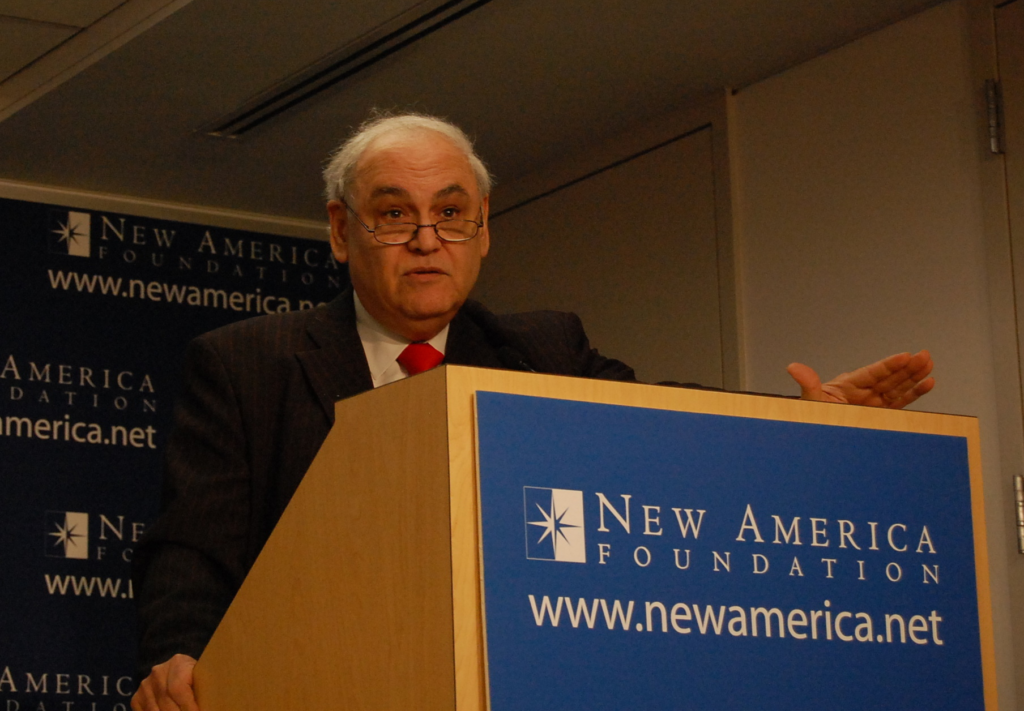
Richard Norman Perle (born September 16, 1941) is an American political advisor who served as the Assistant Secretary of Defense for Global Strategic Affairs under President Ronald Reagan. He began his political career as a senior staff member to Senator Henry “Scoop” Jackson on the Senate Armed Services Committee in the 1970s. He served on the Defense Policy Board Advisory Committee from 1987 to 2004 where he served as chairman from 2001 to 2003 under the Bush Administration before resigning due to conflict of interests. A key advisor to Secretary of Defense Donald Rumsfeld in the Bush administration, Perle was an architect of the Iraq War. In March 2001, he claimed that the Saddam Hussein regime possessed weapons of mass destruction. He has been described as a neoconservative hawk on foreign policy issues. He has been involved with several think-tanks, including the Washington Institute for Near East Policy, the Center for Security Policy, the American Enterprise Institute, Project for the New American Century, and the Jewish Institute for National Security Affairs.
and Peter Thiel, Co-Founder of PayPal and President of Clarium Capital Management.
The topic of discussion was: “The first 100 days of the Obama administration”.
Obama: A New Sociopolitical Era or the Greatest Deception – Library of Rickandria
Perle briefed the Adleson Institue’s staff and faculty and said that the outcome of Obama’s new approach towards adversaries will be tested in a few months’ time.
Thiel, who participated in Perle’s briefing, said that there is an incredible gap between Israel’s reality and its potential.
People talk about:
- China
- India
- Brazil
as emerging market countries, he added, while Israel is underrated.
According to Thiel, all it takes is a short visit to Israel in order to appreciate the incredible talent, intensity and drive of the Israelis.
It should here be reminded that Richard Perle that Thiel met in a briefing, is the infamous Neo-con from the Bush era who was one of the main Jewish architects behind the Iraq invasion and war in 2003.
Facebook sponsor Peter Thiel reveals his Israel agenda in a video speech he made for the Adelson Institute.
The Adelson Institute gives the following description of Thiel’s video message:
Israel is Truly the Country of the Future
May 17, 2009
There is an incredible gap between Israel’s reality and its potential, says Peter Thiel, Co-Founder of PayPal and President of Clarium Capital Management.
Thiel, a guest of the Adelson Institute for Strategic studies, participated in Richard Perle’s briefing at the Adelson Institute.
People talk about:
- China
- India
- Brazil
as emerging market countries, says Thiel, while Israel is underrated.
All it takes is a short visit in order to appreciate the incredible talent, intensity and drive of the Israelis.
In the video Peter Thiel – economic sponsor and Facebook Board member – hails the Jewish state of Israel.
Here follows a transcript of some of his statements in the video:
“I believe that Israel is a truly extraordinary place.”
“…an incredible potential…”
“Just visiting here [in Israel] for a few days one is always struck by the incredible talent and intensity and drive of the people.”
“I think that if Israel is able to resolve some of these issues, that surround it over the next few years, it will probably be the best place in the world.”
“I believe the future is not in cheap labor or cheap capital or in real estate. I believe the future is in technology and in that sense perhaps Israel is truly the country of the future.”
The Adelson Institute for Strategic Studies at the Shalem Center in Jerusalem is a 100 % Zionist institution.
We here reproduce the Mission Statement of the institute Thiel cooperates with:
The Adelson Institute for Strategic Studies at the Shalem Center in Jerusalem is an academic and research institute founded by its chairman, Natan Sharansky, in 2007.

Natan Sharansky (Hebrew: נתן שרנסקי; Russian: Ната́н Щара́нский; Ukrainian: Натан Щаранський, born Anatoly Borisovich Shcharansky on 20 January 1948) is a Soviet dissident and later Israeli politician, human rights activist and author who spent nine years in Soviet prisons as a refusenik during the 1970s and 1980s. He served as Chairman of the Executive for the Jewish Agency from June 2009 to August 2018. Sharansky currently serves as chairman for the Institute for the Study of Global Antisemitism and Policy (ISGAP), an American non-partisan organization.
The Adelson Institute for Strategic Studies develops, articulates and builds support for the strategic principles needed to address the challenges currently facing Israel and the West.
Israel, as the only democracy in this region surrounded by totalitarian governments, is on the cutting edge of the challenges and dangers confronting Western civilization everywhere.
As part of this overall effort, the Adelson Institute for Strategic Studies seeks to explore how the advancement of:
- freedom
- democracy
- human rights
can be marshaled as an effective measure to secure and strengthen international stability and security.
The Adelson Institute for Strategic Studies also seeks to examine international law in light of the new forms of asymmetric warfare and terror; the establishment of credible deterrence against guerilla and terror organizations and the states that sponsor them; the appropriate response to weapons of mass destruction; and the strengthening of Israel’s relations with its strategic allies.
Natan Sharansky, founder and chairman of the institute, is a racist Russian Jew and Israeli politician (former deputy Prime Minister) famous for his “tough” stance on the Palestinians.
Palestinian resistance to Zionist domination is branded as “terrorism”.
Sharansky writes in Jan. 15, 2009 (Bloomberg.com) on the ongoing Israeli slaughter in Gaza:
Terrorism is a cancer that can’t be cured through “proportional” treatments.
It requires invasive surgery.
Here follows another article on Peter Thiel and Israel from [vc] cafe:
Peter Thiel gambles on the next internet hit – Israel’s Hooja – VC Cafe
Peter Thiel gambles on the next internet hit
Israel’s Hooja
Peter Thiel knows a thing or two about consumer internet.
After all, he’s a PayPal cofounder, one of Facebook’s board members and its first investor ($500,000) way before its $15 billion valuation, giving him a hefty return of a billion.
Thiel is known as a savvy investor with a ‘golden touch’ that tends to invest small amounts early on taking a ‘hands-off’ approach with management (learn more about his investment strategy in Thiel’s recent WSJ profile).
Apart from Facebook, Thiel invested in some of the internet’s biggest brand names early on, including:
- Yelp
- Slide
and Friendster.
These days, Peter Thiel is managing the hedge fund Clarium Capital, which manages $2 billion under management and he’s also a partner in the Founders Fund, that recently raised $220 million for its second fund.
Now, for the first time, Thiel is betting an Israeli tech startup, to be the next winner.
Globes reports that Thiel, along with a group of private investors, raised $1.5 million for Hooja, an Israel-based startup founded in April of 2006 by Naama Moran, a former Greylock Partners associate.
Spotlight Interview: Na’ama Moran, CEO and Co-Founder, Cheetah | (restauranttechnologynews.com)
Na’ama Moran – Co-Founder & CEO @ Cheetah – Crunchbase Person Profile
An Interview with Na’ama Moran, CEO of Cheetah, Alchemist Class 2 (alchemistaccelerator.com)
Na’ama Moran, CEO of Sourcery, Wins Top Women in Foodservice Technology – Food & Beverage Magazine (fb101.com)
Hooja is still operating in stealth mode (landing page only) but it’s known to be developing a unique search technology that enables content providers to search for personal and social information in the deep web, including social networks.
One of Hooja’s investors describes the technology as ’social search’ – basically providing higher ranking to information that a user’s friends are likely to click on.
Other Board members
The other Board members of Facebook apart from Thiel are Mark Zuckerberg himself, the Jewish venture capitalist Jim Breyer
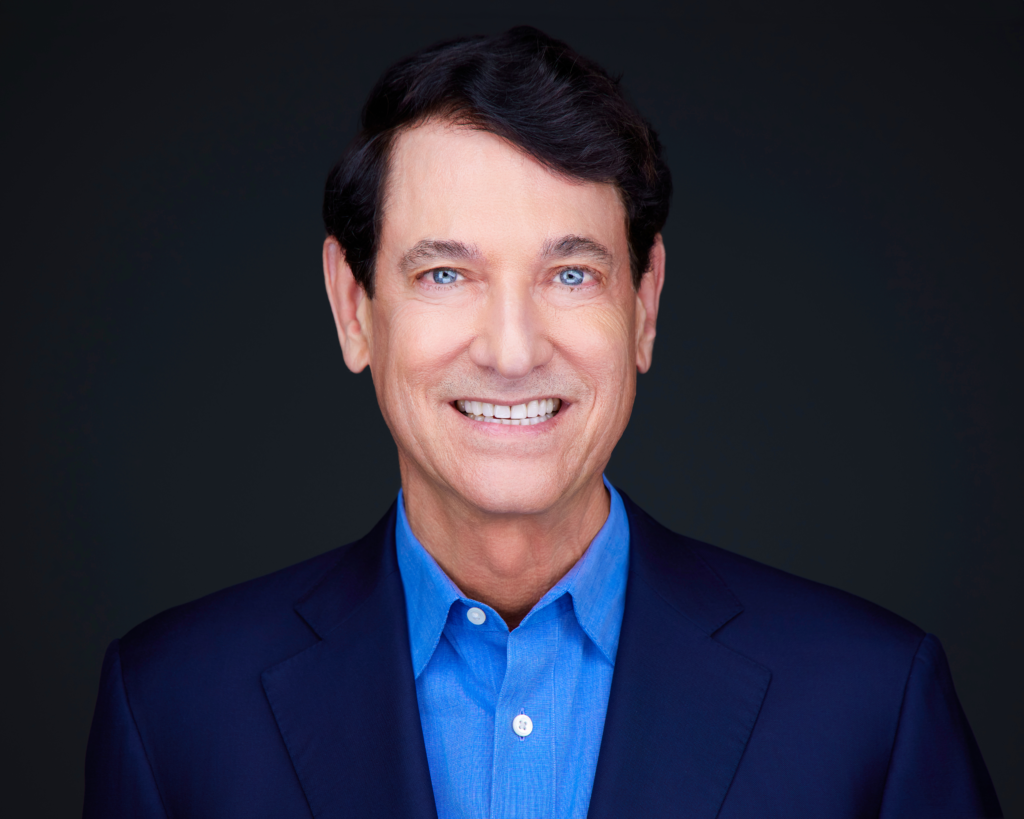
James W. Breyer (born July 26, 1961) is an American venture capitalist, founder and chief executive officer of Breyer Capital, an investment and venture philanthropy firm, and a former managing partner at Accel Partners, a venture capital firm. Breyer has invested in over 40 companies that have gone public or completed a merger, with some of these investments, including Facebook, earning over 100 times cost and many others over 25 times cost. On the Forbes 2021 list of the 400 richest Americans, he was ranked #389, with a net worth of US$2.9 billion.
and finally Marc Andreessen.
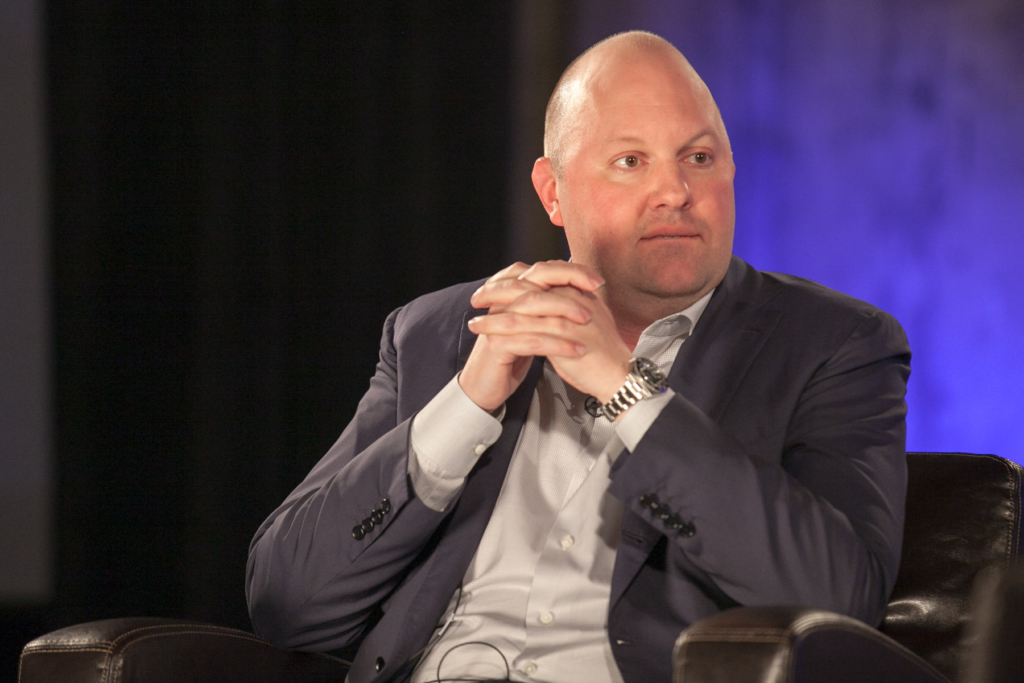
Marc Lowell Andreessen (born July 9, 1971) is an American businessman and software engineer. He is the co-author of Mosaic, the first widely used web browser with a graphical user interface; co-founder of Netscape; and co-founder and general partner of Silicon Valley venture capital firm Andreessen Horowitz. He co-founded and later sold the software company Opsware to Hewlett-Packard. Andreessen is also a co-founder of Ning, a company that provides a platform for social networking websites and an inductee in the World Wide Web Hall of Fame. Andreessen’s net-worth is estimated at $1.7 billion. Critics of Andreessen allege he displayed a conflict of interest by effectively negotiating against Facebook shareholders.
Jim Breyer also sits in the Board of Directors of:
- Dell
- Walmart
- Marvel
Marc Andreessen is the founder of Netscape (non-Jewish?), but a man who works closely with the Jew Ben Horowitz with whom he founded Opsware.
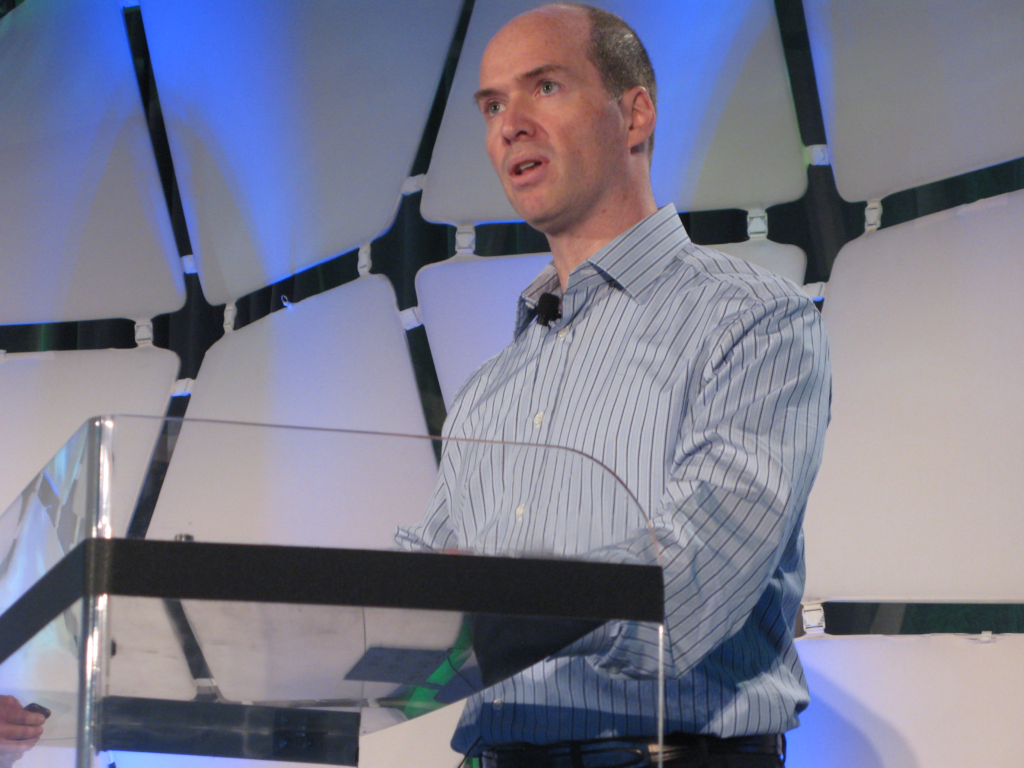
Benjamin Abraham Horowitz (born June 13, 1966) is an American businessman, investor, blogger, and author. He is a technology entrepreneur and co-founder of the venture capital firm Andreessen Horowitz along with Marc Andreessen. He previously co-founded and served as president and chief executive officer of the enterprise software company Opsware, which Hewlett-Packard acquired in 2007. Horowitz is the author of The Hard Thing About Hard Things: Building a Business When There Are No Easy Answers, a book about startups, and What You Do Is Who You Are: How to Create Your Business Culture.
Andreessen has also invested in the Israeli Israel Seed Partners thus becoming a partner of and cooperating with Jonathan Medved, one of Israel’s leading venture capitalists.

Jonathan Medved (born September 16, 1955) is a serial entrepreneur, venture capitalist and angel investor in Israel’s high-tech scene. He is the founder and CEO of OurCrowd, a leading equity crowdfunding platform. Medved was named one of the “50 Most Influential Jews” by the Jerusalem Post, where he was dubbed “the startup nation’s guru.” Jon lives in Jerusalem with his wife Jane, their children and grandchildren.
So, Andreesen – Jew or not – is well entangled in the Jewish-Israeli Internet establishment.
In our section on Google we detailed Sheryl Sandberg, a Jewish woman who was Google’s Vice President of Global Online Sales & Operations.
As Rabbi Levi Brackman and journalist Sam Jaffe write in their book “Jewish Wisdom for Business Success”, p. 2:
Early in 2008, she left Google to become the second-in-command of Facebook, the emerging social-networking company.
The Jewish “second-in-command of Facebook” Sheryl Sandberg is presently Chief Operating Officer.
As COO, Sandberg is responsible for helping Facebook scale its operations and expand its presence globally.
Sandberg in this position manages:
- sales
- marketing
- business development
- human resources
- public policy
- privacy
and communications and reports directly to Facebook’s CEO Mark Zuckerberg.
It can here be repeated that Sandberg is married to another Jew, David Goldberg, former music head at Yahoo!.
Another recruit from Google is the Jew Elliot Schrage, now Vice President of Communications, Public Policy and Platform Marketing at Facebook.
In this position he is responsible for developing and coordinating key messages about products, corporate business and partnerships.
He also oversees the company’s public policy strategy worldwide.
At Google Schrage was Vice President of Communications and Public Affairs and in our special section on Google we documented how he worked to promote propaganda together with the Jewish “US Holocaust Memorial”.
Another Jew who has had positions of influence in Facebook was Justin Rosenstein, a top engineer who was one of the first employees Facebook poached from Google, where he was a Product Manager, as Facebook began its rise in 2007.
Both Dusty Moskovitz and Rosenstein have since left Facebook (2008) to jointly start Internet ventures of their own.
Ethan Beard is head of Platform at Facebook.
Earlier he was Director of Business Development. Prior to joining Facebook, he was a director of social media at Google.
Facebook and Israel
The Jewish state sees the importance in Internet Jews such as Mark Zuckeberg.
In 2008 the Israeli paper Ha’aretz reported:
Facebook, Google founders to attend Jerusalem conference in May by Guy Grimland Ha’aretz Correspondent 01/04/2008
Co-founder of internet giant Google, Sergey Brin, will join Facebook founder Mark Zuckerberg, and Yahoo president Susan Decker at a presidential panel on technology to be held at the Jerusalem International Convention Center May 13-15.
The convention, which was formed at the initiative of President Shimon Peres, will also be attended by a number of Israeli:
- political
- religious
- financial
leaders, as well as academics and cultural figures.
The panel will discuss issues facing technology in today’s age and the future, in particular in regard to how it will affect Israel and the Jewish world.
Former UK prime minister Tony Blair will also take part in the conference, as will:
- French Foreign Minister Bernard Kouchner
- former U.S. Secretary of State Henry Kissinger
- former prime minister of the Czech Republic Vaclev Havel
- Nobel Prize Laureate Eli Wiesel
and Georgia President Michael Saakashvili.
Here we see how the young Jewish entrepreneur Zuckerberg, with fellow Internet-Jew Sergey Brin, is invited down to the Jewish state to participate in the celebrations of Israel’s 60th anniversary (which was the reason the meeting was held) and to meet with the top Zionist echelons.
(It should here be noted that Shimon Peres is a war criminal.
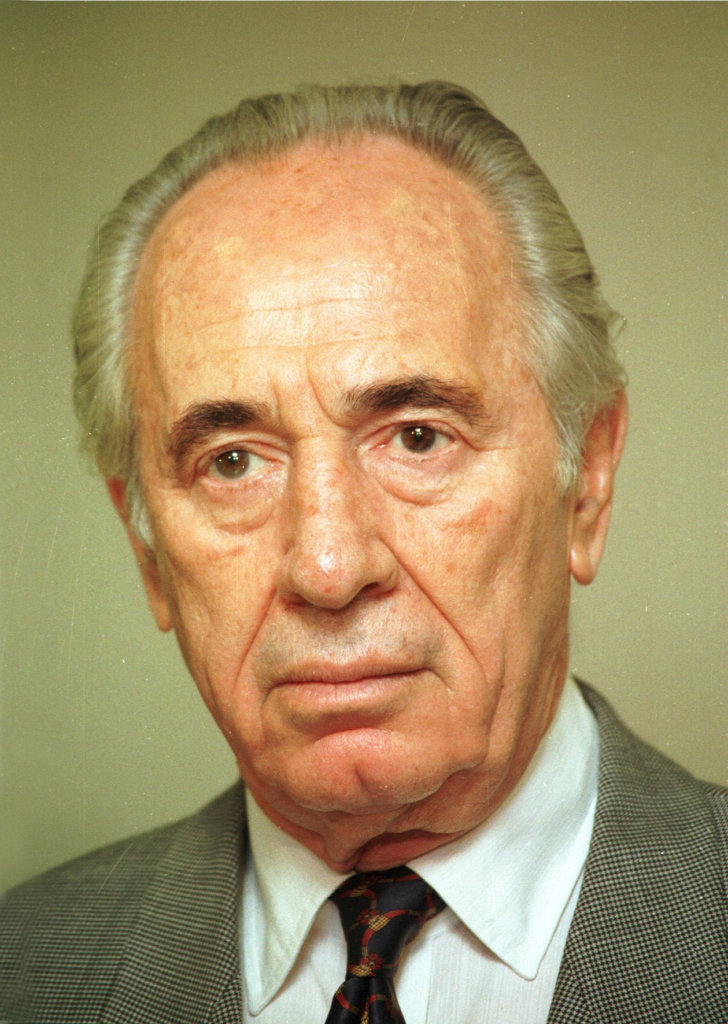
Shimon Peres (/ʃiːˌmoʊn ˈpɛrɛs, -ɛz/ shee-MOHN PERR-ess, -ez;[1][2][3] Hebrew: שמעון פרס [ʃiˌmon ˈpeʁes] ⓘ; born Szymon Perski, Polish: [ˈʂɨmɔn ˈpɛrskʲi]; 2 August 1923 – 28 September 2016) was an Israeli politician who served as the eighth prime minister of Israel from 1984 to 1986 and from 1995 to 1996 and as the ninth president of Israel from 2007 to 2014. He was a member of twelve cabinets and represented five political parties in a political career spanning 70 years. Peres was elected to the Knesset in November 1959 and except for a three-month-long interregnum in early 2006, served as a member of the Knesset continuously until he was elected president in 2007. Serving in the Knesset for 48 years (with the first uninterrupted stretch lasting more than 46 years), Peres is the longest serving member in the Knesset’s history. At the time of his retirement from politics in 2014, he was the world’s oldest head of state and was considered the last link to Israel’s founding generation. From a young age, he was renowned for his oratorical brilliance, and was chosen as a protégé by David Ben-Gurion, Israel’s founding father. He began his political career in the late 1940s, holding several diplomatic and military positions during and directly after the 1948 Arab Israeli War. His first high-level government position was as deputy director general of defense in 1952 which he attained at the age of 28, and director general from 1953 until 1959. In 1956, he took part in the historic negotiations on the Protocol of Sèvres, which was described by British Prime Minister Anthony Eden as the “highest form of statesmanship”. In 1963, he held negotiations with U.S. President John F. Kennedy, which resulted in the sale of Hawk anti-aircraft missiles to Israel, the first sale of U.S. military equipment to Israel. Peres represented Mapai, Rafi, the Alignment, Labor and Kadima in the Knesset, and led Alignment and Labor. Peres first succeeded Yitzhak Rabin as acting prime minister briefly during 1977, before becoming prime minister from 1984 to 1986. As foreign minister under Prime Minister Rabin, Peres engineered the 1994 Israel–Jordan peace treaty and won the 1994 Nobel Peace Prize together with Rabin and Yasser Arafat for the Oslo Accords peace talks with the Palestinian leadership. In 1996, he founded the Peres Center for Peace, which has the aim of “promot[ing] lasting peace and advancement in the Middle East by fostering tolerance, economic and technological development, cooperation and well-being. After suffering a stroke, Peres died in 2016 near Tel Aviv.
In 1996 he was responsible, as the leader if the Jewish state, of Israel’s massacre of over 100 Lebanese civilians in Qanna.)
On March 11th, 2008, Nick O’Neill posted an interview with Mark Zuckerberg where they touched on the subject of “anti-Semitism” and Internet:
Recently Shimon Peres suggested that Israelis and Jews worldwide use Facebook to fight antisemitism in addition to inviting Mark Zuckerberg to Israel.
I asked him about his thoughts on Facebook as a tool to fight antisemitism and if Facebook would take proactive measures to fight against it.
Mark believes that Facebook need to focus on building useful communication tools and that the users can use these tools to connect and generate more worldly perspectives.
As such Facebook does not need to be proactive about it.
When asked about whether he will visit Israel next year, he said maybe.

Mark Zuckerberg (left) with fellow Jewish Facebook co-founder Dustin Moskovitz
First Facebook user has joined the IDF
A quite telling detail is that the first real user of Facebook, apart from the co-founders, is a Jew, Arie Hasit (who carries the Facebook URL id 7).
The Number Seven – Library of Rickandria
Hasit studied with Zuckerberg in Harvard and later on did what the Jews call Aliyah to Israel, that is he settled in occupied Palestine in accordance with the Jewish Law of Return.
Hasit has since joined the Israel Defense Forces Spokespersons Unit, a propaganda/disinformation unit of the IDF.
The Israeli paper Ha’aretz ran a piece on Hasit and Facebook 10/05/2009 (underlines below added by Radio Islam):
Facebook founder’s roommate recounts creation of Internet giant by Guy Grimland Ha’aretz Correspondent
Five years ago, hardly anybody had heard of Facebook.
Today, it seems that there is nobody in Israel or the world over who is not familiar with the social networking Web site, which recently crossed the 200 million user threshold.
Facebook is estimated to be worth $15 billion after Microsoft bought 1.6 percent stock in the company for $240 million.
Arie Hasit, 26, witnessed the birth of Facebook.
He shared the same apartment as Mark Zuckerberg, the site’s founder, joined the same college fraternity, and witnessed first-hand the company’s initial climb from a dormitory start-up to a dominant mega-monstrosity on the Web.
Hasit grew up in Philadelphia.
Since he was young, he dreamed of immigrating to Israel, which he did two years ago.
Today he is serving in the Israel Defense Forces Spokespersons Unit.
He chose to enlist for a year-and-a-half rather than the six months which are required of new immigrants in his age bracket.
Israel is not foreign to him.
“Every summer I was in Jewish summer camp in the U.S. From time to time I would visit Israel.”
After completing high school at age 18, he enrolled at Harvard University, where he studied the history of the Land of Israel.
“I thought this would make it easier for me after I would get to Israel,” Hasit said.
“My parents actually thought I should learn computers so that I would work in high-tech when I got here.”
Hasit focused his studies on the hip-hop genre in Israel, a subject which would become the topic of his thesis.
He met Mark Zuckerberg in 2002 after they had joined the same fraternity which primarily concentrated on activities within the Jewish community.
“We ate Shabbat dinner together,” Hasit said.
“Every year we raised money for charities in Israel.
Mark was one of the members of the fraternity, like many other Jewish students at Harvard.”
Hasit, who wears a skullcap, says the 25-year-old Zuckerberg feels an affinity with Judaism.
“He fasts on Yom Kippur,” Hasit says of Zuckerberg.
“Sometimes he would come to the Hillel House, a Jewish organization that ran various activities.”
Hasit and Zuckerberg struck up a friendship, though they were not the closest of friends.
They later lived together in the college dorms.
“Mark just happened to live in the apartment where I lived in the dorms,” Hasit said.
“He was in one room while I was in the other.
This was a large apartment, we were seven students crammed into five bedrooms.
We saw each other every day for a number of hours.
When Mark moved into the dorms, I was already in my third year while he was in his second year.”
Hasit says that Zuckerberg decided one day to build a Web site that would serve as a utility for students at Harvard.
“He built the site for fun,” Hasit says.
“We had books called Face Books, which included the names and pictures of everyone who lived in the student dorms.
At first, he built a site and placed two pictures, or pictures of two males and two females.
Visitors to the site had to choose who was ‘hotter’ and according to the votes there would be a ranking.”
“He only ranked people who received the most votes for being good looking, not everybody,” Hasit said.
“There were about 1,000 people in all.
Within four, five hours the site became so popular that at one point it became impossible to surf the Web on Harvard’s Internet server.
This was on a Sunday in October 2003.”
“The next day, the head of the university denied Zuckerberg access to the Internet.
People complained that Mark used their pictures without permission.
He apologized and ultimately the university decided not to expel him even though there were columns in the campus newspaper that argued that what he did was completely improper.”
Zuckerberg’s stunt came at a time when students were appealing to the university to develop a Web site that would include the pictures and contact details of students in dorms.
Now they feared that the Zuckerberg episode would compel the administration to shelve the idea.
“Mark heard these pleas and decided that if the university won’t do something about it, he will, and he would build a site that would be even better than what the university had planned,” Hasit said.
“Before founding Facebook, he built the site Course Match which allowed students to find out who among those living in the same dorm are taking what courses, so that they could form study groups.”
Zuckerberg started developing Facebook from his modest dorm room.
Every visitor who registered at the site received a serial number.
The first, second, and third user who registered took up dummy pages.
The fourth user was Zuckerberg himself.
The fifth user is Chris Hughes, a co-founder of Facebook who also served as the company’s spokesperson.

Chris Hughes (born November 26, 1983, is an American entrepreneur and author who co-founded and served as spokesman for the online social directory and networking site Facebook until 2007. He was the publisher and editor-in-chief of The New Republic from 2012 to 2016. Hughes co-founded the Economic Security Project (ESP) in 2016. In 2018, he published Fair Shot: Rethinking Inequality and How We Earn.
Dustin Moskovitz, the third part of the site’s founding triumvirate, occupies the sixth user spot.
Moskovitz led the technical staff at Facebook before quitting the company to found a start-up in 2008.
Hasit’s is the seventh registered user, which in practice makes him the fourth real user to log into Facebook.
“Often people ask me how I became the fourth user.
Sometimes I tell them.”
“Mark came to me on the day he built Facebook, and he said to me, ‘Arie, I built this site.
I want you to sign up.’
And that is how I signed up to Facebook.
I put a favorite quote of mine in the profile.
I specified my favorite books, which courses I take at Harvard.
I uploaded one picture to the profile.
There was no Wall.
There was no News Feed.
There weren’t too many things in Facebook, which only began its lifespan on the Web.
“Initially Zuckerberg asked a small group of people to sign up to Facebook.
At a certain point he told us to start inviting friends, and that is what we did on the first and second day which the site went up on the Web.
We could only invite students enrolled at Harvard.
In fact, if you did not have a Harvard e-mail address you could not sign into Facebook.
At first, dozens of Harvard students registered.
The numbers then reached the hundreds, and by the fourth day it had already reached the thousands.
People were very enthusiastic about the site.
It enabled them to know who took what courses and to meet new people.
It conquered Harvard.
In less than a week, some 4,000 students signed up for Facebook.”
Hasit recalls how Zuckerberg spent hours in front of the computer.
“He studied computers and psychology,” Hasit said.
“Despite the fact that he developed Facebook, he continued his studies as per usual.
His grades were okay.
He was even in a relationship with a girlfriend.
During Facebook’s initial days, the walls in his room were filled with graphs and charts which showed how many people joined on a daily basis, who used what application, and who has the most friends.”
“After a few weeks, he decided to open up Facebook to another university.
He had two friends, one at Stanford and the other at Dartmouth, whom he asked to promote the site there.
He also asked for help from his ex-girlfriend who was a student at Dartmouth.”
Facebook quickly attracted a following in other leading universities.
“Every user specified which university he belonged to, and that was how he kept in touch with other students at the university in which he studied, but all the networks were under one Web site.”
The graphs and charts in his room became graphs and charts which included statistics from all the universities.
At one point he received requests from students at other universities who were not in Facebook to open the site to them as well.
Summary
So, we now know that the Mark Zuckerberg, founder and CEO of Facebook,
“feels an affinity with Judaism” and has “raised money for charities in Israel”
In Facebook’s early history Zuckerberg was assisted by the Jew Dustin Moskovitz and got funding from Jewish businessman Peter Thiel, the latter a man with open Zionist views and in contact with the Zionist establishment.
Thiel then joined the Board of Facebook and is presently – according to The Guardian – “the real face behind Facebook”.
Other top names are co-Board member Jim Breyer and the Jewess Sheryl Sandberg, the “second-in-command of Facebook”.
And one of Zuckerberg’s friends from Harvard – his roommate and Facebook’s first real user – has since moved to Israel and joined the Israel Defense Forces Spokespersons Unit.
This also reveals the mindset of people in Zuckerberg’s proximity.
Knowing this one is not surprised thet the arch-Zionist Shimon Peres invited Zuckerberg to Israel in 2008.
We here give links to more information on Facebook:
The Guardian on the Jews behind Facebook

Guardian article that gives some idea about the people behind Facebook, including the Jewish moneyman, Peter Thiel.
Facebook and Instagram ban antisemitic conspiracy theories and blackface | Facebook | The Guardian
Facebook allowed advertisers to target ‘Jew haters’ | Facebook | The Guardian
Several men arrested after dispute over secret tunnel in Brooklyn synagogue | New York | The Guardian
Facebook might censor criticism of Zionists. That’s dangerous | Rabbi Alissa Wise | The Guardian
Jewish Internet Defense Force ‘seizes control’ of anti-Israel Facebook group article from The Jerusalem Post.
CONTINUE:
Sugar Mountain: Mark Zuckerberg – The Ultimate Fake Person Award – Library of Rickandria
